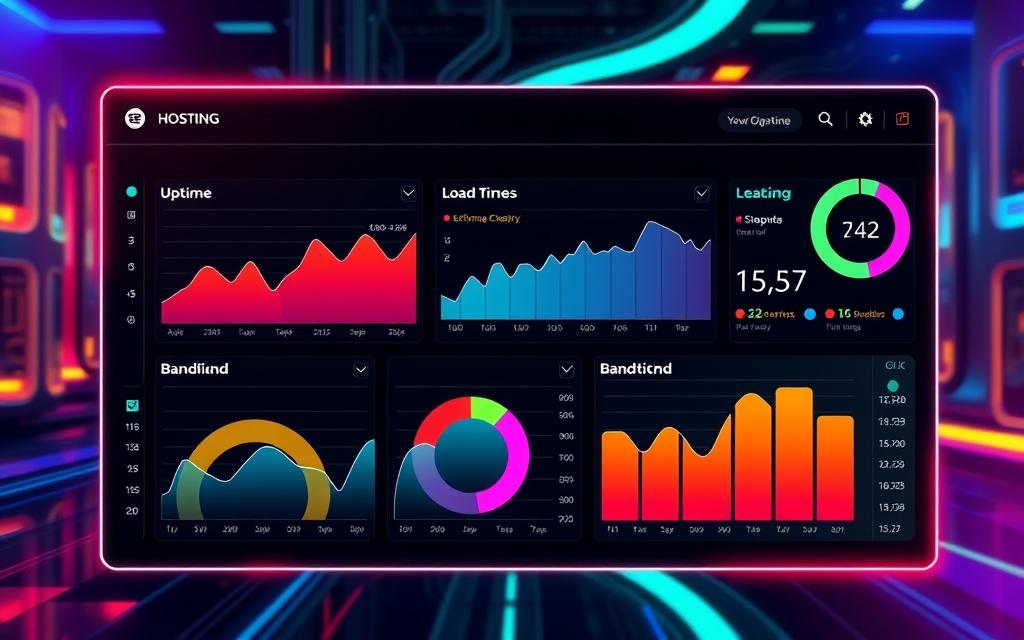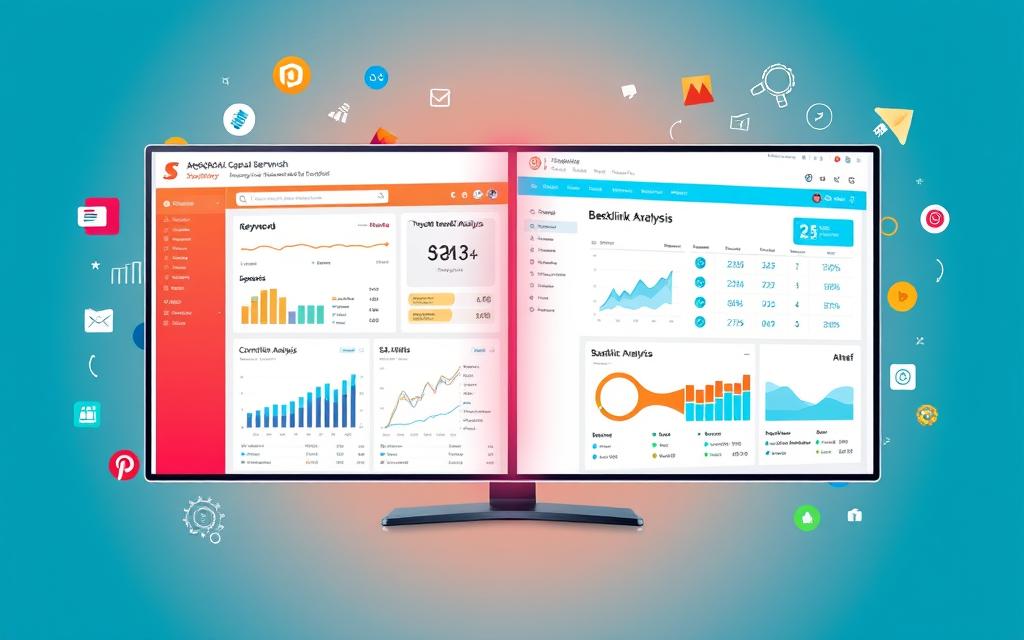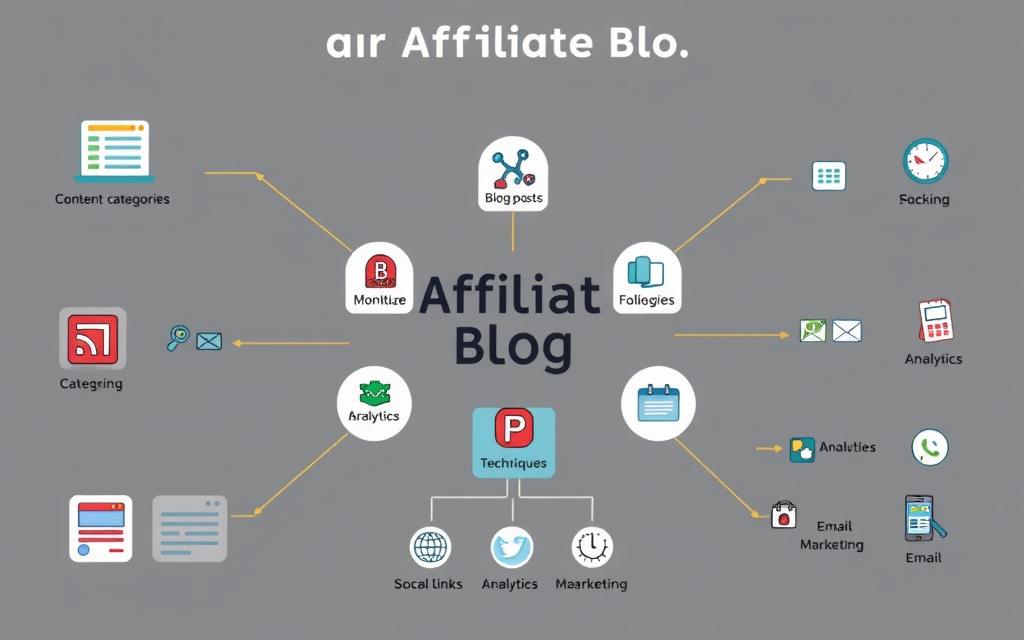Are you an affiliate marketer wanting to grow your blog? The right hosting package is key to your success. This guide will help you find the best hosting for your affiliate blog.
Choosing the right hosting can be tough with so many options. But don’t worry, we’re here to help. We’ll make sure you pick a hosting that fits your needs and budget. Ready to build a successful affiliate blog?
Key Takeaways
- Understand the importance of hosting for affiliate blogs and its impact on site performance and SEO
- Identify the key features to look for in hosting packages, including uptime guarantees, speed, and customer support
- Explore the different types of hosting options, from shared to dedicated, to determine the best fit for your affiliate blog
- Learn how to compare pricing structures and watch out for hidden fees when selecting a hosting provider
- Discover the top hosting providers for affiliate blogs and analyze their strengths and weaknesses
Understanding the Importance of Hosting for Affiliate Blogs
Choosing the right hosting provider is key to your affiliate blog’s success. The right hosting can improve your blog’s performance, user experience, and search engine rankings. It’s vital for any affiliate blogger aiming to grow online.
Why Choose the Right Hosting Provider?
Choosing the right hosting provider is crucial. It ensures your blog is always available and runs smoothly. Hosting features like bandwidth and storage affect your blog’s growth and scalability.
Impact on Site Performance
The hosting you pick greatly affects your blog’s performance. Server speed, uptime, and load times are important. Slow sites and downtime can lose visitors and hurt your marketing efforts.
Role in SEO
Hosting also affects your blog’s SEO. Search engines like Google favor fast, reliable sites. Choosing the right hosting can boost your blog’s visibility and attract more visitors.
In affiliate blogging, picking the right hosting is a big decision. It impacts your blog’s performance, user experience, and search rankings. It’s essential for any affiliate marketer’s success.
Key Features to Look for in Hosting Packages
When picking a hosting package for your affiliate blog, look at several key features. These features can greatly affect your site’s performance and how users experience it. Important factors include uptime guarantees, speed optimization, storage capacity, and customer support quality.
Uptime Guarantees
Website owners worry about their site being always available. Look for hosting providers with strong uptime guarantees, usually between 99.5% and 99.9%. This ensures your affiliate blog stays online and accessible to your audience.
Speed and Performance
Your website’s speed and performance are crucial for user experience and SEO. Choose hosting providers that focus on speed optimization. They should offer features like caching, CDNs, and advanced servers. This ensures your blog loads fast, improving user engagement and search engine rankings.
Customer Support
Good customer support is vital when you face issues or need help with WordPress compatibility. Look for providers with 24/7 support, various communication options, and a history of quick and effective problem-solving.
| Feature | Importance | What to Look For |
|---|---|---|
| Uptime Guarantees | Ensures your site is consistently available to visitors | Aim for at least 99.5% uptime guarantee |
| Speed and Performance | Enhances user experience and SEO | Look for features like caching, CDNs, and advanced server architecture |
| Customer Support | Provides assistance when you need it | 24/7 support, multiple communication channels, and a proven track record of responsiveness |
By focusing on these key features when choosing a hosting package, your affiliate blog will run smoothly. It will offer a great user experience and be ready for your future success.
Types of Hosting to Consider
When picking a web host for your affiliate blog, you have many choices. Each hosting type has its own good and bad points. It’s key to know the differences to find the right one for your needs and budget. Let’s look at the main hosting types you’ll find:
Shared Hosting
Shared hosting is very affordable. Your site shares server space with others. It’s great for small to medium-sized blogs with not too much traffic. But, it might be slow when lots of sites are busy.
VPS Hosting
VPS hosting gives you more control and resources than shared hosting. Your site gets its own server space, but you’re still on the same physical server as others. It’s better for growing blogs because it’s faster and more scalable.
Dedicated Hosting
If your blog gets a lot of traffic or needs special resources, dedicated hosting is for you. You get your own server, giving you full control and top performance. It’s the best choice for big, successful blogs.
Cloud Hosting
Cloud hosting is a newer, but popular choice. It uses many servers to offer flexible and scalable hosting. It’s great for reliability, speed, and growing with your blog, making it a top pick for many.
When choosing, think about your site’s traffic, needs, budget, and how much control you want. Knowing the pros and cons of each helps you pick the best hosting for your affiliate blog.

Pricing Structures of Hosting Packages
Choosing the right web hosting plan for your affiliate blog is key. It’s important to understand the difference between monthly and annual billing. Also, watch out for hidden fees to find an affordable hosting solution.
Monthly vs. Annual Billing
Web hosting providers often offer both monthly and annual billing. Monthly plans are convenient, but annual subscriptions can save a lot of money. Think about your budget and your blog’s growth to choose the best plan.
Hidden Fees to Watch For
- Domain registration and renewal fees
- SSL certificate charges
- Bandwidth or data transfer limits
- Setup or activation fees
- Automatic renewal charges
It’s important to read the fine print to avoid unexpected costs. Knowing about hidden fees helps keep your hosting plan affordable and in line with your pricing comparison for your affiliate blog.
Cost Comparison Examples
| Hosting Provider | Monthly Plan | Annual Plan | Savings with Annual Plan |
|---|---|---|---|
| Bluehost | $9.99/month | $59.88/year | $59.88 |
| SiteGround | $14.99/month | $143.88/year | $35.88 |
| HostGator | $11.95/month | $119.40/year | $43.20 |
The examples show the savings of choosing an annual web hosting plans over monthly. By looking at affordable hosting options, you can find the best deal for your affiliate blog.
Popular Hosting Providers for Affiliate Blogs
Choosing the right web hosting for your affiliate blog is crucial. Many top hosting providers are trusted by affiliate marketers. They offer features that meet the specific needs of bloggers. Let’s look at four popular options for affiliate bloggers.
Bluehost
Bluehost is well-known in the web hosting world. It’s famous for its strong WordPress support and wide range of hosting plans. With an easy-to-use dashboard and one-click WordPress setup, Bluehost is a top choice for affiliate bloggers.
SiteGround
SiteGround is a top pick for affiliate bloggers. It’s known for fast servers, advanced caching, and great customer support. These features help improve site performance and user experience.
HostGator
HostGator is a budget-friendly option for hosting affiliate blogs. It offers many hosting plans and scalable resources. With reliable uptime and easy-to-use tools, HostGator is a cost-effective choice for growing affiliate businesses.
WPEngine
WPEngine is a premium choice for affiliate bloggers. It’s known for top-notch WordPress optimization, strong security, and advanced performance tools. WPEngine is perfect for those who need the fastest site speed and reliability.
When choosing a hosting provider, consider several factors. Look at web hosting plans, WordPress compatibility, customer support, and performance. This will help you pick the best hosting for your affiliate marketing needs.
Analyzing the Pros and Cons of Each Provider
Choosing the best hosting provider for your affiliate blog is key. It’s important to look at the good and bad sides of top choices. Let’s explore the strengths and weaknesses of Bluehost, SiteGround, and HostGator.
Bluehost: Strengths and Weaknesses
Bluehost is a trusted name for new bloggers. It offers easy-to-use interfaces, low prices, and lots of storage and bandwidth. But, its performance can be spotty, and support might not always help experienced bloggers.
SiteGround: What to Consider
SiteGround is known for great customer service and strong security. It’s a top pick for bloggers who want reliable hosting and peace of mind. However, it can be pricier, and shared hosting might not scale as well as others.
HostGator: Benefits and Drawbacks
HostGator is easy to use, offers many hosting options, and is affordable. It has lots of storage and bandwidth, plus a simple website builder. But, support can be inconsistent, and some users face downtime or performance problems.
| Hosting Provider | Strengths | Weaknesses |
|---|---|---|
| Bluehost |
|
|
| SiteGround |
|
|
| HostGator |
|
|
By looking at the pros and cons of each provider, you can choose wisely. The right hosting can greatly affect your blog’s performance and success.
Comparing Hosting Performance Metrics
Choosing the right hosting for your affiliate blog is key. Look at important metrics from different providers. These metrics affect your site’s success and user experience.
Load Time Analysis
The load time of your site is crucial. Fast load times keep visitors interested and lower bounce rates. Check the average load times of hosting packages. Choose providers with reliable, consistent performance, even when traffic is high.
Uptime Reports
Uptime is another important metric. Your affiliate blog needs to be always available to your audience. Look at uptime reports and service-level agreements (SLAs) from different providers. Make sure they meet your needs and expectations.
Scalability Options
As your blog grows, you’ll need hosting that can scale with it. Look for hosting with flexible bandwidth limits and storage capacity. This way, you can easily upgrade as your site’s needs change.
| Hosting Provider | Load Time (s) | Uptime (%) | Scalability |
|---|---|---|---|
| Bluehost | 0.8 | 99.98% | Excellent |
| SiteGround | 0.6 | 99.99% | Very Good |
| HostGator | 1.2 | 99.95% | Good |
| WPEngine | 0.5 | 99.99% | Excellent |
By carefully looking at these metrics, you can pick the best hosting for your affiliate blog. This choice will help your site grow and meet your goals.

Understanding User Reviews and Feedback
Choosing the best hosting package for your affiliate blog is easier with user reviews. Real customer testimonials offer valuable insights. They help you make an informed decision and find the right web hosting plan.
Importance of Customer Testimonials
Customer testimonials give you a real look at hosting providers. They show the strengths, weaknesses, and performance of each company. This info is key to seeing if a hosting package fits your needs.
Where to Find Reliable Reviews
- Independent review sites: Websites like TrustPilot, HostingAdvice, and G2 offer detailed reviews and ratings from real customers.
- Hosting provider’s website: These sites can give useful insights into what the company offers and their customer support.
- Social media platforms: Look for discussions and comments on Twitter and Facebook for fresh feedback from users.
How to Interpret Ratings
When looking at hosting provider ratings, don’t just focus on the number. Consider the number of reviews, overall sentiment, and common themes. Look at uptime, speed, customer service, and how well the provider responds to user concerns.
| Hosting Provider | Average Rating | Number of Reviews | Key Highlights |
|---|---|---|---|
| Bluehost | 4.2/5 | 24,857 | Reliable uptime, responsive support, good for beginners |
| SiteGround | 4.6/5 | 18,372 | Fast loading speeds, excellent customer service, advanced features |
| HostGator | 3.9/5 | 15,629 | Affordable pricing, user-friendly platform, occasional downtime issues |
By carefully reviewing user feedback and ratings, you can understand the pros and cons of different hosting plans. This knowledge helps you choose the best option for your affiliate blog.
Making the Final Decision
Choosing the right hosting for your affiliate blog can seem hard. But, with the right steps, you can find a good deal that fits your needs. It’s important to think about what you need, your budget, and use trial periods and guarantees to make a smart choice.
Evaluating Your Needs
First, figure out what your blog needs. Do you need good customer support, reliable uptime, or better performance? Make a list of what’s essential for you. Then, compare hosting features using this list.
Budget Considerations
Then, think about how much you can spend on affordable hosting. It’s easy to pick the cheapest option, but quality matters too. Look for clear pricing comparison and no hidden fees.
Trial Periods and Money-Back Guarantees
- Use trial periods to test services and see if they fit your needs.
- Choose hosting with money-back guarantees. This way, you can cancel and get a refund if you’re not happy.
- These options help you make a safe choice for your blog without losing money.
By carefully looking at your needs, budget, and using trial periods and guarantees, you can pick the best hosting package for your blog. This sets you up for success in the long run.
Conclusion: Choosing the Best Hosting Package
After looking at different hosting options, it’s time to pick the best one for your affiliate blog. The right hosting can really help your site perform well, improve SEO, and succeed in affiliate marketing.
Summary of Key Takeaways
This guide showed how important hosting is. We talked about the key features and the good and bad of popular hosts. Things like uptime, speed, customer support, and price are all important for choosing the right hosting.
Encouragement to Take Action
Now you know a lot about hosting. It’s time to use this knowledge to choose the best hosting for your blog. Think about what you need, your budget, and how you want your blog to grow. Try out different hosts and use their trial offers to find the best one.
Final Thoughts on Hosting for Affiliate Blogs
Choosing the right hosting is key to a successful affiliate blog. A good host means a better user experience, better search engine ranking, and more profits. Your hosting choice today will affect your blog’s future a lot.












Leave a Reply